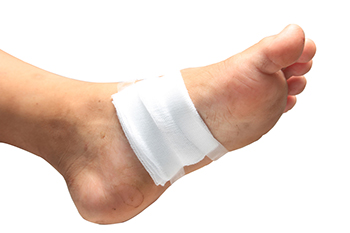
Diabetic patients with foot ulcers can experience significantly reduced quality of life due to chronic pain, limited mobility, and the risk of serious complications like infection or amputation. These ulcers, often caused by poor circulation and nerve damage, can make everyday activities difficult and may lead to prolonged hospital stays or social isolation. The emotional toll, including stress and anxiety, further impacts their overall well-being. Managing foot ulcers in diabetic patients requires a comprehensive approach. Regular foot exams by a podiatrist, proper wound care, and the use of custom orthotics or footwear can help reduce pressure and promote healing. Blood sugar control is critical in preventing further damage. In more severe cases, advanced treatments like hyperbaric oxygen therapy or surgery may be needed. If you suffer from diabetic foot ulcers, it is strongly suggested that you include a podiatrist on your team of healthcare providers to improve functioning. Education on daily foot care, combined with early intervention, can help prevent ulcers and improve your well-being.
Wound care is an important part in dealing with diabetes. If you have diabetes and a foot wound or would like more information about wound care for diabetics, consult with Julie Jurd-Sadler, DPM from Progressive Podiatry. Our doctor will assess your condition and provide you with quality foot and ankle treatment.
What Is Wound Care?
Wound care is the practice of taking proper care of a wound. This can range from the smallest to the largest of wounds. While everyone can benefit from proper wound care, it is much more important for diabetics. Diabetics often suffer from poor blood circulation which causes wounds to heal much slower than they would in a non-diabetic.
What Is the Importance of Wound Care?
While it may not seem apparent with small ulcers on the foot, for diabetics, any size ulcer can become infected. Diabetics often also suffer from neuropathy, or nerve loss. This means they might not even feel when they have an ulcer on their foot. If the wound becomes severely infected, amputation may be necessary. Therefore, it is of the upmost importance to properly care for any and all foot wounds.
How to Care for Wounds
The best way to care for foot wounds is to prevent them. For diabetics, this means daily inspections of the feet for any signs of abnormalities or ulcers. It is also recommended to see a podiatrist several times a year for a foot inspection. If you do have an ulcer, run the wound under water to clear dirt from the wound; then apply antibiotic ointment to the wound and cover with a bandage. Bandages should be changed daily and keeping pressure off the wound is smart. It is advised to see a podiatrist, who can keep an eye on it.
If you have any questions, please feel free to contact our offices located in Ijamsville and Mouth Airy, MD . We offer the newest diagnostic and treatment technologies for all your foot care needs.
